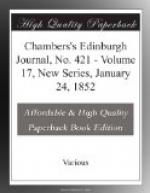1st, I can only reconcile the different accounts furnished by emigrants—believing people to write as they think at the time—by remembering that some have come from quiet rural places, and others from populous towns. The first will consider Geelong—its beautiful bay, ships, and steamers, as a hustling, improving, and increasing town, laid out for a future provincial capital; the last will regard it as a dull, detached series of villages, which will some day be a large town. A modification of these causes, allowing for age, temperament, circumstances, and station in life, will explain any ordinary discrepancy in the accounts from this country.
2d, The various accounts of the climate must in a measure be traced to the same causes. People used to out-door labour in Britain find the winter so mild, that everything is lauded to the skies; those used to nice, roomy, convenient houses at home, finding themselves so very differently situated, condemn climate, prospects, and everything. Both may convey a false impression. The cold or heat by the thermometer is no test of sensation; days, however warm, are exceedingly agreeable, except the hot-wind days, which are absolutely indescribable, yet I have seen some men work out all day in the worst of them. They cause great relaxation in the system, and produce dysentery, especially among children. Compared with other hot countries, this appears to be the most agreeable.
3d, Employment.—This is readily to be obtained by working mechanics of all kinds in the towns; remembering that a very small sprinkling of workmen for finer work—such as cornice-mouldings, fine freestone work, cabinetwork, &c.—will be able to find employment for a long time to come, because, till a new generation spring up, who can live upon the accumulations of their sires, money will not be diverted to any great extent from business in land, buildings, or merchandise. A considerable number of labourers will find employment about the towns, at the stores, on the wharfs, &c. at about 24s. weekly. Country work on the sheep-stations—as shepherds, drivers of bullock-drays, sheep-washing and shearing, cooking for the men, &c.—is remunerated by about L.25 and food. These live far off in the solitary plains, almost apart from men, and come to town once, twice, or thrice a year, as their distance and employment may determine. The Sabbath has little of the religious character for them, and they know little of the progress of mankind. Agriculture also employs men at about the same rate. There is no probability of wages falling, for a long time to come, with any stream of emigration likely to come out hither; for if the country cannot grow more wool, a greater attention to its quality would employ more men; and agriculture will absorb a vast population as soon as the land-question has been fairly overhauled, and settled on a foundation that will allow a small capitalist to obtain, at a fair price, a suitable farm: besides, everything necessary to civilisation has yet to be done—roads, bridges, quarries, wells, and a long etcetera that one can scarcely catalogue.




